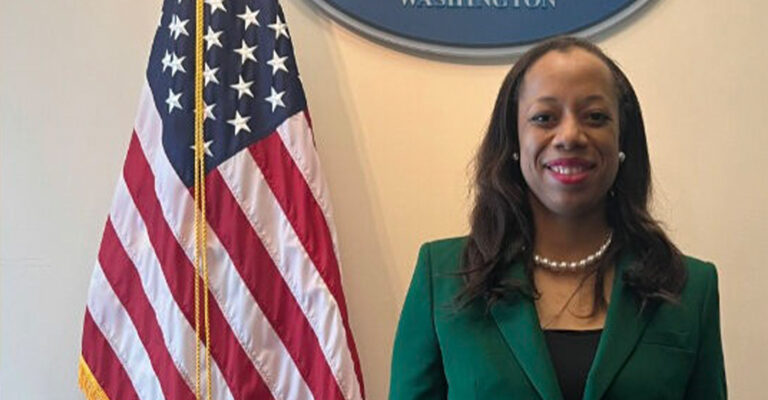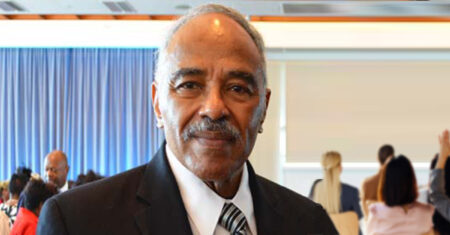By Stacy M. Brown
Black Press USA Senior National Correspondent
As global tensions spike following President Donald Trump’s strikes on Iran’s nuclear facilities and Tehran’s retaliation with missile launches at U.S. bases in Iraq and Qatar, national security and foreign policy expert Asha Castleberry-Hernandez warned that the United States is dangerously close to a full-blown war.
Speaking in an exclusive interview with Black Press USA’s Let It Be Known, Castleberry-Hernandez, a former senior official in the Biden administration’s Bureau of Near Eastern Affairs and an Iraq War veteran, called the situation “deeply concerning,” especially given what she described as escalating international alignment behind Iran and widespread inexperience in key U.S. national security positions.
“My reaction was quite concerning with regards to potential escalatory behavior,” Castleberry-Hernandez said. “Many Americans were not supportive of strikes in Iran because they want to avoid an escalatory war or just U.S. involvement overall.”
Last week, B-52 bombers carried out airstrikes on three Iranian nuclear sites. The Department of Defense claims those sites were eradicated. In response, Iran launched missiles targeting U.S. military installations in Qatar and Iraq. While U.S. forces successfully intercepted the missiles, Castleberry-Hernandez cautioned that the conflict is intensifying quickly and diplomatically difficult to contain.
“If we had just stayed in the Iran nuclear deal, which President Obama started, this could have been avoided,” she said. “The Iran nuclear deal worked.”
She blamed the Trump administration for withdrawing from the agreement, which she said led to the loss of leverage with Iranian leadership. “We transitioned from diplomacy to defense,” she said, noting that Iran now has greater backing from nations like China, Russia, and North Korea.
Castleberry-Hernandez, author of the memoir, “Why National Security Matters,” noted that under the U.S. Constitution, the commander-in-chief has the latitude to conduct such airstrikes. But she questioned whether Trump’s actions—reportedly carried out without broad consultation with his national security team—violate the constitutional balance between the executive and legislative branches.
“This is why it matters who we put in the Oval Office,” she said. “You’re giving them access to trade policy, nuclear codes, and how they manage the troops.”
Castleberry-Hernandez said Vice President Kamala Harris’s previous warning that a Trump presidency could lead to war was not alarmist. She pointed to the growing signs of Iranian aggression even before Trump took office and said U.S. intelligence had long indicated that Iran was close to building a nuclear bomb.
“Now that Trump is in, he’s going to do anything he can to stop Iran from becoming a nuclear state. And this is what you’re seeing play out right now,” she said.
Asked how close the U.S. is to war, Castleberry-Hernandez said developments are moving by the hour. “President Trump is demanding a ceasefire, but let’s see if Iran will come to the table,” she said. “Iran knows the U.S. has an asymmetric operational advantage, and that may eventually bring them to negotiate.”
Castleberry-Hernandez rejected claims that Israeli Prime Minister Benjamin Netanyahu had manipulated Trump into the strikes but confirmed that Israeli intelligence strongly influenced the decision. “Israel had legitimate concerns and shared them. President Trump, lacking the political capital but influenced by Israel, decided to move forward,” she said.
With approximately 40,000 U.S. troops in the region, Castleberry-Hernandez stressed that their safety is paramount. But she warned that domestic security is also at risk, recalling how past conflicts in the Middle East have sparked terror attacks on American soil, such as those in San Bernardino and Orlando.
“We’ve already seen violence near the Israeli embassy and in Colorado. These conflicts fuel both anti-Semitism and Islamophobia here at home,” she said, adding that cities like New York have ramped up security in response.
She also warned of cyber threats and information warfare, especially with Iran’s close ties to Russia. “They’re very capable in conducting cyberattacks and manipulating online disinformation to destabilize us,” she said.
Castleberry-Hernandez raised concerns about the economic fallout, particularly in the oil and global markets. “Engaging Iran disrupts the global energy market. Gas prices and stock fluctuations could spike, especially if this conflict drags on.”
She also confirmed reports that multiple Republican lawmakers purchased “war stocks” just hours before the strikes. “I’m pretty sure those that were trading were fully aware of what was going to happen,” she said.
As questions swirl about Trump’s decision-making and reports suggest that many national security officials were shut out of the process, Castleberry-Hernandez said her book was meant to educate Americans about why qualified leadership is essential.
“I wrote ‘Why National Security Matters’ because I saw a growing rejection of global engagement,” she said. “But we’re more interconnected than ever—through cyber threats, pandemics, and climate change.”
She criticized the current administration’s staffing of key security posts with inexperienced personnel, including a 22-year-old former grocery clerk now reportedly working in Homeland Security.
“It’s already playing out. These inexperienced officials are more prone to rubber-stamp Trump’s decisions. Compared to his first administration, this is far more dangerous,” she said.
Asked if the U.S. is more vulnerable than ever, Castleberry-Hernandez replied, “We are. Not just because of inexperience, but because the world has learned how not to work with us anymore. Our troops, our economy, our national security institutions—everything is at risk.”
She called on the American people to act. “We don’t have the House or Senate to provide real checks. It has to come from the people—mobilize and engage with your elected officials. The American people can make a difference working together right now,” she said.






